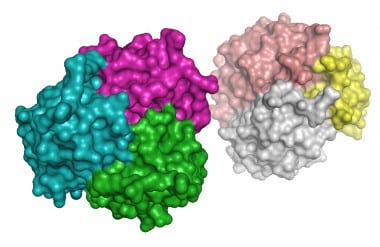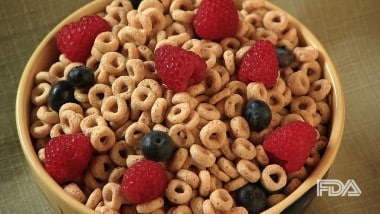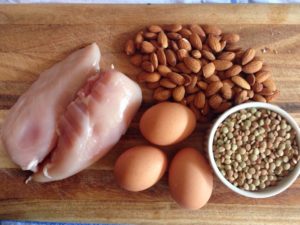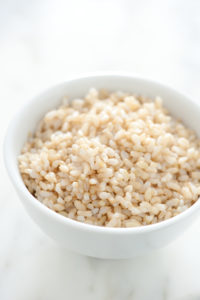What Macros For Muscle Gain Does Your Body Need?
Studies have shown, that the impact of nutrition on muscle gain is as important as the training itself.
Besides having the right caloric intake it is vital, to eat the right combination of macronutrients to gain weight quickly.
With the wrong macronutrients, you might end up not gaining muscle, or even gaining fat.
In this guide, we are going to explain the ratio of carbs, fats & protein that works best for you!
So keep reading if you want to learn how to bulk up quickly while staying lean at all times!
The Role Of Calories - Tip
Before discussing the importance of macros, I wanted to remind you, that calories itself are an essential factor, especially if you plan to lean bulk.
So if you plan to adjust your macronutrients to get quick muscle gain, you shouldn't wonder about getting different results than expected if you neglect your caloric intake.

Therefore I recommend you to limit or increase your caloric intake depending on your metabolism and level of physical activity. If you don't know what your caloric intake is, you should look for a calorie calculator online, in order to get a rough estimate.
One surprising aspect about calories is, that being in a caloric surplus is not directly related to muscle gain, while fat loss is directly related to being in a caloric surplus.
But you are going to get more detailed information about this in the section below!
Cutting & Bulking Simultaneously?!
There has been a lot of controversy and different opinions on bulking without gaining any fat. But let's get straight to it:
You clearly can cut fat & gain muscle mass at the same time!
The Explanation:
As this might be surprising information for you (or not), it is important to understand the reason, showing that you can do both at the same time.
As mentioned in the section above, you need to be in a caloric deficit in order to lose fat. On the other hand, you don't have to be in a caloric surplus to gain muscle.
So what is primarily affecting muscle growth?
Protein!
As you might have guessed, protein is vital for you to gain muscle, but there are more factors on gaining muscle.
In order to get into the state of hypertrophy, you need to have a positive Nitrogen balance. Nitrogen can be found in the essential amino acids, which is why eating protein will increase your bodies nitrogen.
But furthermore, there are two more important factors influencing hypertrophy.

Sleep
In fact, training itself doesn't even build muscle, it is simply the stimulus that tells your muscles to grow. Most of your progress happens overnight, during quality sleep. Therefore you should try to sleep 7-8 hours per day, without changing bed & waking times more than 2 hours.
Overtraining
Another factor, negatively influencing your nitrogen balance is overtraining. As you train, your muscle tissue gets broken down and then gets rebuilt during periods of rest. But since this process requires Nitrogen, the nitrogen balance of your body will lower.

So when training in excessive amounts or without giving your body time to recover, your body is not going to be able to keep up a positive nitrogen balance.
Read this article on lean bulking if you want to know more about cutting & bulking simultaniously!
What Is The Best Protein/Fat/Carb Ratio?
Now that we've already covered the most important aspects regarding protein, it is time to talk about the relation between the macronutrients.
Regarding protein, it is important to eat least 1g per kg of your own bodyweight. Studies have shown that 1.5g - 2g lead to optimal hypertrophy whereas everything above 2g is not going to be used by your body.
Therefore you need to adjust your protein intake, according to these guidelines if you want to gain muscle mass quickly.
With carbs & fats, on the other hand, there has been quite a bit of controversy and myths around blogs, mainstream media & other sources.
Considering, that there are perspectives on both extremes (low carb vs low fat), it can be confusing to figure out the right ratio.
One aspect that people frequently forget when considering their carb & fat intake is their metabolism!
What Is Your Metabolism?
Most people that are conscious about their weight & physique got to now their metabolism. Oversimplified there are two types, whereas you are either a hardgainer, struggeling to gain muscle & fat. Or you have a slow metabolism, where it is comparably easy to build muscle but similarly easy to get fat.
Obviously there are people who are in between the two extremes, as every human has a different metabolism genetically.
On the other hand, your metabolism doesn't only depend on genetics but also on what you eat & how much exercise you do.
In general, it makes sense to put as much effort into boosting your metabolism as possible, to be able to eat more. (unless you like fasting)
How To Boost Your Metabolism
If you want to boost your metabolism it is important to increase fat burning hormones. Since there are several hormones in your body, that have an impact on your metabolism there fortunately are multiple strategies to give your metabolism that tiny little bonus.
Adiponectin

This hormone is pretty much one of the most important indicators in relation to fat loss.
Fortunately it is surprisingly easy to increase the balance of this hormone in your body. Two of the most common ways are;

- Eating More Fiber
Studies have shown that an increased fiber intake is directly related to having higher adiponectin levels. Therefore increasing your fiber through nutrition or supplements is an essential step to get lean faster!
- Drinking Black Coffe
Another surprising way to increase the level of adiponectin in your body is by drinking black coffee. Furthermore it decreases the amount of cytokines which are a cause of inflammation.

Both these ways have been scientifically proven and tested by groups, and are probably the easiest & most natural ways to increase your Adiponectin levels.
If you are looking for more ways to increase your Adiponectin, you should read this article.
Figuring Out Macros
Now that you know how fast your metabolism is/can be, you are able to calculate the amount of carbs & fat.
If you were wondering why the metabolism matters at all to determine how many carbs/fat you should eat, here's the answer:
- Digestive Speed!
Carbohydrates are usually digested a lot faster than fats, although it highly depends on the Glycemic Index , of the food. Therefore somebody with a slow metabolism, is likely to get energy to quickly when eating quickly digested carbs.
Somebody with a fast metabolism on the other hand, has to bother less about eating too many carbs as he burns them before turning them into fat easier.
Macros For Hardgainers
So as a guideline, hard gainers should be eating more carbs than fats. Since your metabolism is fast you can increase the intake of carbs that your body can consume fast, without gaining unnecessary fat.
Overall, it is important to focus on eating enough carbs throughout the day. Integrate healthy sources of carbohydrates, while still getting 25% of your calories from eating fat.

Macros For "Average Metabolism"
If you have a somewhat "average metabolism" you can still eat quite a lot of carbs if you are going to bulk. But in comparison to the hard gainers especially sugars are going to lead to faster weight gain since your body doesn't consume all the glucose as fast.
Once again as a basic rule you should be eating 1.5-2g of protein per kg of your body weight while having 25% of your caloric intake from fat. But since you should eat fewer calories overall, then sb with a speedy metabolism, you are going to have a significantly lower carb intake.
Macros For Slow Metabolism
If you belong to the ones that gain weight fairly quick, you should focus on eating food that provides you with energy slowly. One of the best methods is to use the Glycemic index, which shows you how fast your body is going to turn specific foods into glucose.
Also since your caloric intake isn't as high, you should focus on eating primarily fat & protein, while keeping carbs comparably low.
Weight Loss Formula
If you want to calculate the amount of carbs, fats and protein that lead to the fastest results you are going to find an equation & examples below.
Before being able to calculate your macronutrients you need to find out two specific stats:
- Caloric Intake (CAL)
- Your Bodyweight (BW)
Once you've got these two basic stats you can start calculating your macronutrients according to this equation:
CAL = (2g of Protein x BW) + (1/9 X CAL x 0.25 x 1g of Fat) + (Carbs)
Since there are many different stats (protein, carbs, fat, grams, calories etc.) the equation can be confusing. Therefore you can find an example below if you are confused:
- Eg Person wants to eat 2000kcal/day & weights 80kg
2000kcal = (2g of Protein x 80kg) + (1/9 x 2000 x 0.25 x 1g of fat) + (Carbs)
2000kcal = (160g of Protein) + (55.5g of Fat) + Carbs
160g of protein = 640kcal
55.5g of fat = 500kcal
So the person needs to eat 860kcal in carbs, which would be 215g per day.
The Role Of Tracking
Without counting your macronutrients you are very likely to start cheating subconsciously or you might even lose track of the number of fats & carbs that you need.
People tracking their nutrition are far more likely to complete their goals, which is why I recommend you to use a tracking program. The best option that you can get for free is called MyFitnessPal, where you can enter all your meals or scan the food that you just ate.
Furthermore, the app is going to show you how much weight you gain/lost each week if you step on the scale on a regular basis.
Guidelines On Food
In regards to food, there are a couple of guidelines to follow when trying to bulk.
- The more processed the worse
Try to limit yourself on fast-food, factory-made cake & other processed foods. All the essential vitamins & micronutrients get lost during the process of preparing these types of food. Furthermore, they often contain unhealthy fats & sugars and artificial flavours that negatively affect your metabolism.
Fat
- Avoid Saturated & Trans Fats
Trans fats can be found in fried foods, and have been shown to have a negative effect on your blood sugar & "bad" cholesterol levels.


Protein
- Integrate all 8 Essential Amino Acids into your nutrition (especially for vegans)
As you might know, protein is made up out of 8 essential amino acids. All these amino acids are needed to get your nitrogen balance positive.
If you aren't vegan, the easiest way to make sure to have the right balance of the essential amino acids is by eating animal sources of protein such as eggs, meat, cheese etc.
All animal foods are complete sources of protein, while plant-based protein only contains some of the essential amino acids.
On the other hand if you combine the right types of plant-based protein, you can easily get enough of each type of amino acid!
Carbs
Look for food with a low Glycemic Index
Especially with a slow metabolism, you want to look for food that takes a long time to digest. Traditionally people would define the absorption & digestion time by looking if the carb is short or long-chain.
But the Glycemic index is far more accurate and more specific since it has been created by measurement & testing. As a reference point, the highest point on the scale would be Glucose, which is digested the fastest & also raises your blood sugar the fastest.

Try to limit yourself to foods below a glycemic index of 50 if possible, to avoid high blood sugar, while losing weight faster.
Conclusion
Nutrition is equally important to put in the exercise itself. Having a good overview of your macros & calories but also micronutrients are going to speed up your progress drastically.
The challenging part of nutrition is that it is a long term reward which makes it tempting to fall towards the trap of processed & unhealthy foods.
But with enough determination & adjusting the food that you buy, the effort is going to be more than worth it!


